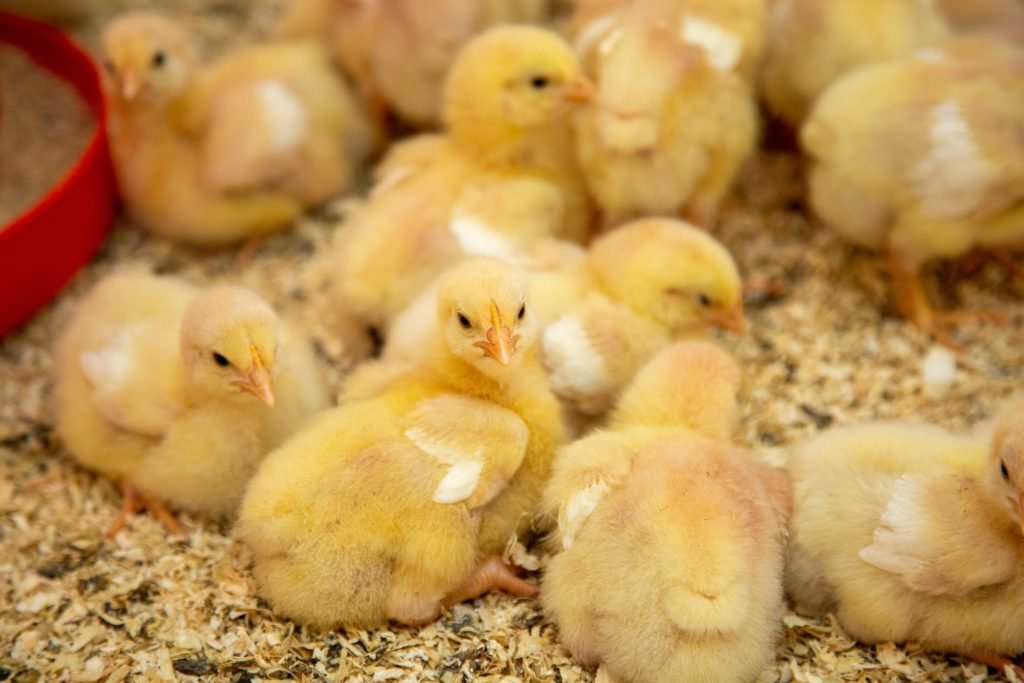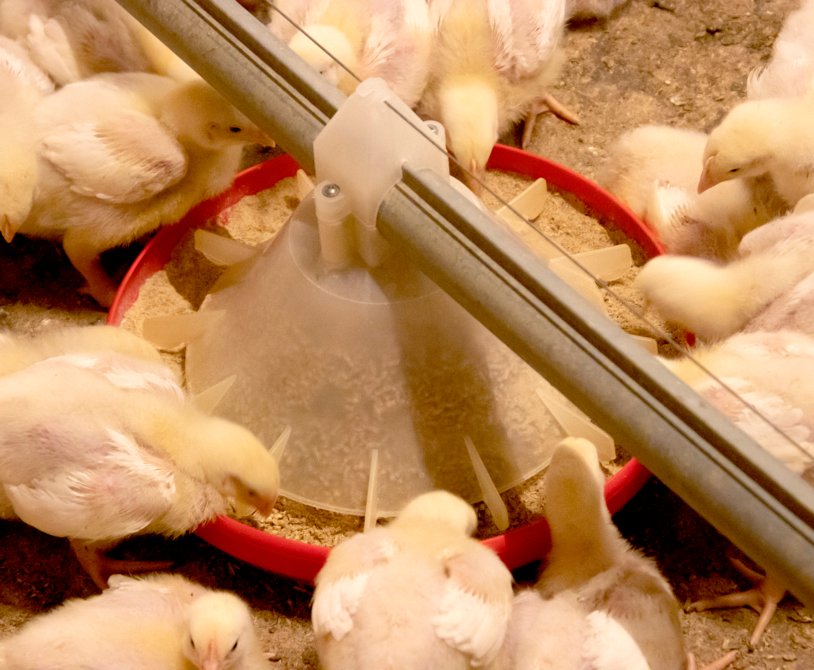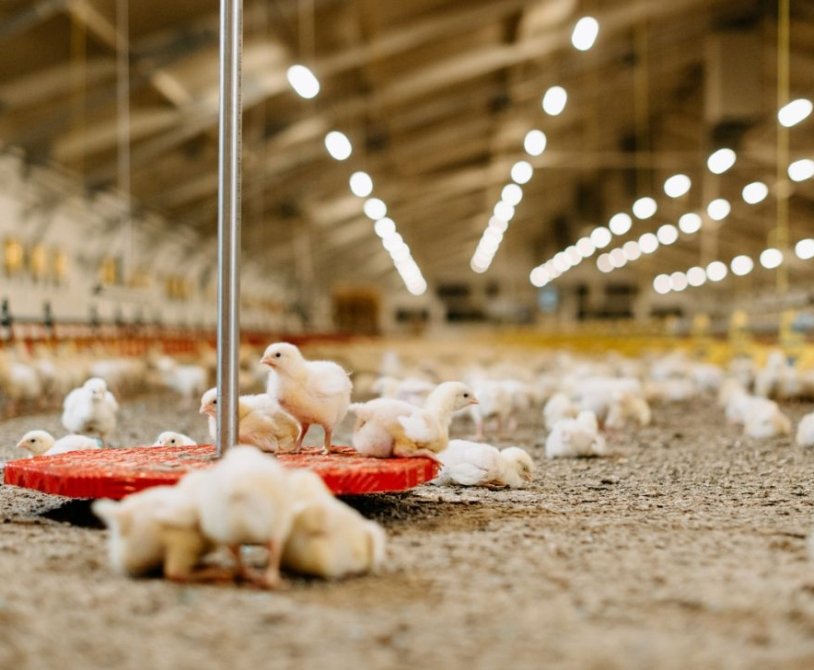The starter phase in broiler farming is key, lasting about the first 14 days. Chicks’ organs and immune system must grow right to meet later goals. It’s vital to manage this phase well, especially with the stress of farm arrival and some vaccinations.
Broiler chicks need special care in the starter phase for a healthy start. This phase sets the stage for the whole production cycle. It’s crucial to focus on the basics, like the right food and environment, and keeping an eye on the chicks’ health.
Key Takeaways
- The initial weight of broiler chicks should be between 40 and 42 grams, with a minimum acceptable weight of 36 grams.
- One gram less of the initial weight may result in a 50-gram reduction in final meat weight.
- Proper feed intake within the first 24 hours is crucial for successful broiler management.
- Protein levels are highest during the starter phase, while metabolizable energy levels are lowest.
- Natural molecules and preservatives are recommended for disease prevention and feed quality.
Getting Ready for a New Production Cycle
When the last broiler chicken cycle ends, it’s key to get the facilities ready for the next one. This means a deep cleaning and disinfecting of the poultry house, feeders, and water troughs. This makes sure the new chicks have a clean and safe place to start.
Cleaning and Disinfecting the Facilities
The first step is to empty the poultry house and wait a few days. This break is crucial for broiler farm preparation and stops diseases from spreading. Then, clean and disinfect everything, including walls, floors, and equipment, to get rid of any germs.
Repairing and Testing Equipment
After cleaning, check and maintain the equipment for the broilers. Make sure the lights, air, and heat systems work well. Also, clean the silos, feed storage, and water tanks to prevent equipment maintenance problems later.
Preparing the Litter
Good litter management is vital for the chickens’ health. Remove the old litter and add fresh, quality litter. The litter should be the right depth and temperature for the chicks’ comfort.
By cleaning and disinfecting well, fixing and testing equipment, and preparing the litter, producers can start the new cycle smoothly. This sets the stage for the broiler chickens to grow well.
The Reception of the Chicks
When the chicks arrive at the farm, it’s important to make their transition smooth. After a long journey from the incubator, they are ready for care. They have fed on the yolk and are now ready to be properly cared for.
Controlling Environmental Factors
Keeping the environment right is key when the chicks arrive. The temperature in the brooding area should be between 33°C and 35°C. This provides a comfortable space for the young birds.
Also, 24 hours of continuous lighting is needed. This helps their natural rhythms and encourages early feeding and activity.
Checking Chick Weights
It’s important to check the chicks’ initial weight. Healthy chicks should weigh between 40 and 42 grams at delivery. A necropsy can also show the weight of the remaining yolk.
Distributing Birds in the Shed
It’s crucial to distribute the chicks evenly in the brooding shed. This prevents overcrowding and competition for resources. It helps create a stress-free environment for their growth.
By managing the chicks’ arrival well, controlling the environment, monitoring their weights, and ensuring even distribution, producers can start the broiler production cycle on the right foot.
How to Manage Broiler Chickens During the Starter Phase
Managing broiler chickens in the starter phase is key to their growth. The first weeks are crucial for their rapid weight gain. Good broiler management ensures they get a strong start, leading to a successful cycle.
Feeding and Watering
Broiler chicks need easy access to feed and water right away. A problem with water can hurt their appetite for food. In the first week, they should grow a lot, needing the right food and activity to eat well.
Monitoring Growth and Performance
Checking the weight of chicks on the seventh day is important. It shows how well they will grow to slaughter. This check helps producers adjust their care to help the chicks grow better.
| Broiler Management Technique | Benefit |
|---|---|
| Ensuring Continuous Access to Feed and Water | Promotes optimal growth and development |
| Monitoring Weight Gain in the First Week | Predicts final slaughter weight and identifies any issues early |
| Stimulating Physical Activity | Encourages feed intake and natural behaviors |
| Maintaining Appropriate Environmental Conditions | Supports chick comfort and health during the starter phase |
By focusing on these key management techniques, producers can help their broiler chickens succeed. This ensures they grow well throughout the production cycle.
Ensuring Proper Feeding from the Start
The first days of a broiler chick’s life are very important. They learn how to eat and drink. This helps their digestive and immune systems grow strong.
During this time, they need a lot of protein. This is because they are growing muscles fast. They also need less energy to keep growing.
Monitoring Feed and Water Intake
Broiler chicks should always have food and water available. This helps them grow without stress. They should eat at least three to four times a day.
It’s also important to keep their water clean and fresh. Dehydration can hurt their appetite and performance.
Providing High-Quality Starter Feed
The starter feed must prevent diseases like coccidiosis. It should also keep the gut healthy and prevent mold. The feed must taste good and be nutritious.
Adding fresh greens, fruits, and veggies to their diet is good. It gives them extra vitamins and minerals. This makes them healthier and hungrier.
Pre-starters with less calcium help them grow more. They can be 2.54% heavier and have better uniformity. This is compared to regular starter diets.
Good broiler chick feeding management is key. It includes watching feed and water intake and giving them the best starter diet formulation. This is crucial for their growth in the first weeks of life.
Environmental Factors in the Starter Phase
Managing the environment is key in the starter phase of broiler production. Temperature control and lighting are two important factors. These conditions affect the health, growth, and performance of broiler chicks.
Temperature Control
Keeping the right temperature is vital for broiler chicks. Studies show that chicks raised in warmer temperatures (like 90°F) grow better. They also have better feed conversion and live longer than those in cooler temperatures (like 80°F).
Chicks in cold temperatures may have weaker immune and digestive systems. This can slow their growth and make them more prone to diseases.
It’s important to keep the chick’s body temperature stable. This prevents performance issues. The air temperature for brooding varies depending on the heat source. It’s also crucial to keep the relative humidity between 50-70% to reduce ammonia and improve health.
Lighting Management
Lighting is crucial in the starter phase of broiler production. On the first day, birds get 24-hour light to encourage eating and drinking. Good lighting ensures chicks can feed, drink, and move around. It also helps them get enough rest.
Ventilation is key to controlling temperature, removing harmful gases, and ensuring air circulation. This keeps the broiler house optimal for growth and health.
By controlling the environment, especially temperature and lighting, producers can ensure a successful starter phase. This optimizes the performance and well-being of their flock.
Nutritional Requirements in the Starter Phase
In the early stages of a broiler chicken’s life, nutrition is key to their growth and health. The starter phase has the highest protein levels but the lowest energy levels. Young birds need more protein to build strong muscles.
Importance of Protein and Energy Levels
The starter feed must have the right mix of protein and energy. Broiler starter diets usually have 22-25% protein for muscle growth. The energy levels in the grower diet (11-24 days) should be around 13.30 MJ/Kg to support the birds’ activity and metabolism.
Preventing Diseases and Optimizing Gut Health
The starter feed also needs to prevent diseases like coccidiosis and imbalances in the gut. Natural molecules, such as intestinal optimizers, help strengthen the gut’s immune system. This prevents harmful microorganisms and improves nutrient absorption.
“Proper nutrition during the starter phase is essential for broiler chicks to reach their full growth potential and maintain optimal health.”
By managing broiler chick nutrition, protein and energy balance, and disease prevention, producers can ensure success in later stages.
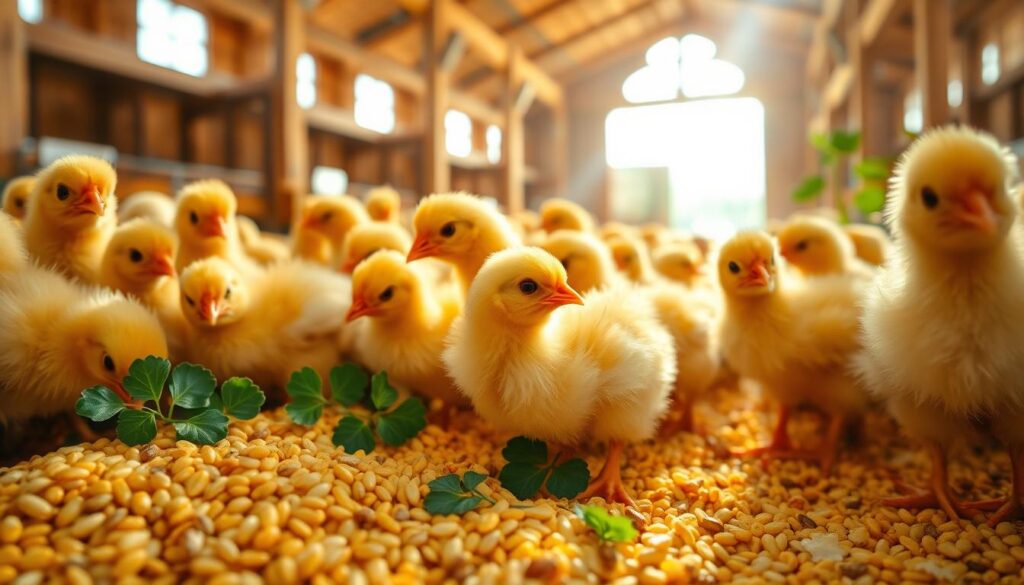
Monitoring Growth and Performance
It’s key to track the growth and performance of broiler chickens in the starter phase. Weighing them regularly, especially on the seventh day, is crucial. This weight is a good indicator of their future weight at slaughter.
A small difference in weight on the seventh day can lead to a big difference by the sixth week. This shows how important it is to monitor their growth closely.
Keeping the flock uniform and viable is also vital. It greatly affects the whole production cycle’s performance. By watching each bird’s growth and health, producers can make better decisions for the flock’s success.
Tracking Weight Gain
Regularly weighing broiler chicks helps producers track their growth. This lets them adjust feeding and management as needed. It helps spot any problems early and ensures the birds reach their target weights efficiently.
- Weigh a sample of birds at least once a week, ideally on the same day each time.
- Record the weights and calculate the average weight gain, as well as the standard deviation, to assess flock uniformity.
- Use this information to adjust feed quantities and monitor the effectiveness of your feeding and management strategies.
Ensuring Uniformity and Viability
Having a uniform and viable flock is key ftobetter production and profit. By tracking each bird’s growth and health, producers can find and fix any issues. This helps the whole flock perform better.
| Key Metric | Importance |
|---|---|
| Flock Uniformity | Ensures consistent growth and performance, allowing for more efficient management and processing. |
| Viability | Minimizes mortality and culling rates, improving the overall productivity and profitability of the flock. |
By monitoring broiler growth mweight gain tracking, and keeping the flock uniformity and viability in check, producers can make informed decisions. This optimizes the performance of their broiler chickens in the starter phase.
Brooding and Early Growth Phase
The journey of a broiler chicken starts in the brooding stage, lasting from day-old to about three weeks. Chicks need a warm, controlled space to grow well. Brooder heaters keep them warm, and they must have clean water and starter feed.
As chicks grow from three to six weeks, they develop fast. They need the right food to grow. The goal is to reach a certain weight by five weeks to ensure quality.
In the first three weeks, chicks focus on growing organs and immune systems. From week three to six, they grow bones and muscles. After six weeks, growth slows, and ovary development speeds up.
Keeping the right temperature is key. It starts at 35°C for the first three days and drops to 19-17°C later. Flock uniformity is also important for managing the flock and improving laying performance.
It’s important to watch average daily gain (ADG) and feed conversion (FCR). These traits affect reproductive efficiency. It’s crucial to control feeding to keep birds at the right weight, especially females from 4 weeks to the end of rearing.
“Flock uniformity is crucial for developing a flock that consistently responds to feed changes at later ages.”
Ensuring proper water consumption is vital for early growth. As birds grow, they need more feeder space. Regular weighing of 2-5% of the flock helps monitor growth and uniformity.
Litter Management for Optimal Conditions
Managing broiler litter well is key to keeping birds healthy. The litter helps by reducing contact with waste, keeping birds warm, and letting them scratch naturally.
Moisture Absorption and Thermal Insulation
It’s important to keep the litter clean, dry, and smooth. The right amount and quality of litter is needed for the birds. Also, giving the birds enough time, at least 14 days, between flock placements helps prevent diseases.
Managing litter moisture is critical to avoid wet litter problems. Birds drink a lot of water, up to 80% of their daily needs. This makes water very important for them.
Promoting Natural Behaviors
Good litter management also improves air quality and keeps the birds comfortable. It’s important to keep at least four inches of dry bedding at 88-92°F. Less than this can hurt the birds’ performance.
It’s best to start with dry litter and low ammonia levels. Removing caked litter, windrowing, and using litter conditioning equipment helps. These steps support the birds’ natural behaviors and health.
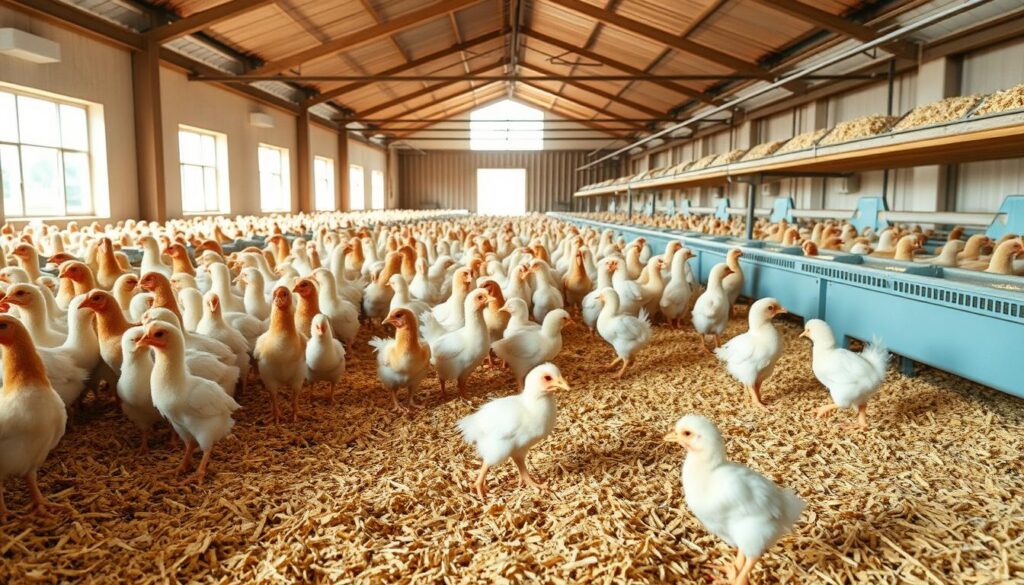
Effective broiler litter management is vital for successful broiler production. By controlling moisture, keeping the right temperature, and encouraging natural behaviors, farmers can improve their flock’s health and performance.
The journey of broiler chickens is truly amazing. They grow fast and become ready for market quickly. Each stage of their life needs careful attention to nutrition, environment, and management. This ensures they stay healthy and productive.
By following broiler management best practices, farmers can make the most of their operations. This leads to successful and sustainable poultry production.
Improving feed and environment is key to broiler success. Monitoring growth and litter management also play important roles. Farmers who keep up with the latest research can always get better at raising broilers.
The poultry industry is always changing, and knowing how to manage broilers is crucial. This knowledge helps meet the world’s need for affordable, quality protein. By staying ahead, farmers can ensure a bright future for the broiler industry.


